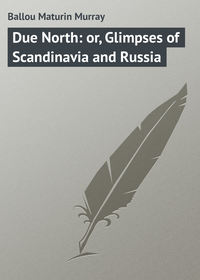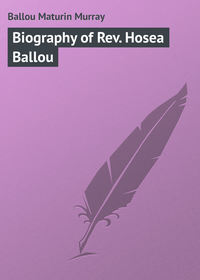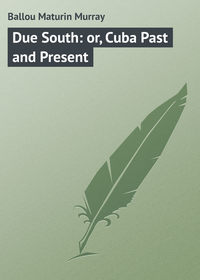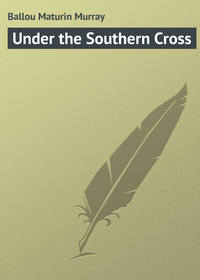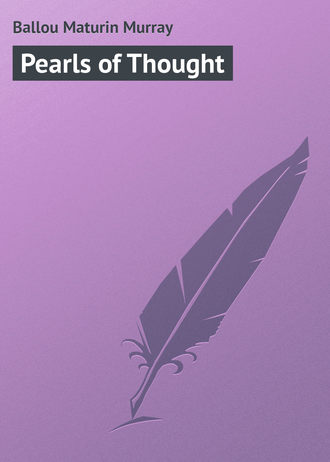 полная версия
полная версияPearls of Thought
Sin is disease, deformity, and weakness. —Plato.
Sin and her shadow death. —Milton.
If ye do well, to your own behoof will ye do it; and if ye do evil, against yourselves will ye do it. —Koran.
It is the sin which we have not committed which seems the most monstrous. —Boileau.
There are sins of omission as well as those of commission. —Madame Deluzy.
Sincerity.– Sincerity is to speak as we think, to do as we pretend and profess, to perform and make good what we promise, and really to be what we would seem and appear to be. —Tillotson.
The whole faculties of man must be exerted in order to call forth noble energies; and he who is not earnestly sincere lives in but half his being, self-mutilated, self-paralyzed. —Coleridge.
Skepticism.– Skepticism is slow suicide. —Emerson.
Skill.– Nobody, however able, can gain the very highest success, except in one line. He may rise above others, but he will fall below himself. —Charles Buxton.
Whatever may be said about luck, it is skill that leads to fortune. —Walter Scott.
The winds and waves are always on the side of the ablest navigators. —Gibbon.
Slander.– Done to death by slanderous tongues. —Shakespeare.
Slugs crawl and crawl over our cabbages, like the world's slander over a good name. You may kill them, it is true, but there is the slime. —Douglas Jerrold.
Slander lives upon succession, forever housed where it gets possession. —Shakespeare.
When the absent are spoken of, some will speak gold of them, some silver, some iron, some lead, and some always speak dirt, for they have a natural attraction towards what is evil, and think it shows penetration in them. As a cat watching for mice does not look up though an elephant goes by, so are they so busy mousing for defects, that they let great excellences pass them unnoticed. I will not say it is not Christian to make beads of others' faults, and tell them over every day; I say it is infernal. If you want to know how the devil feels, you do know if you are such an one. —Beecher.
If parliament were to consider the sporting with reputation of as much importance as sporting on manors, and pass an act for the preservation of fame as well as game, there are many would thank them for the bill. —Sheridan.
Sleep.– When one asked Alexander how he could sleep so soundly and securely in the midst of danger, he told them that Parmenio watched. Oh, how securely may they sleep over whom He watches that never slumbers nor sleeps! "I will," said David, "lay me down and sleep, for thou, Lord, makest me to dwell in safety." —Venning.
After life's fitful fever he sleeps well. —Shakespeare.
Sleep is no servant of the will; it has caprices of its own; when courted most, it lingers still; when most pursued, 'tis swiftly gone. —Bowring.
Yet a little sleep, a little slumber, a little folding of the hands to sleep. —Bible.
Heaven trims our lamps while we sleep. —Alcott.
Night's sepulchre. —Byron.
Sleep is pain's easiest salve, and doth fulfill all offices of death, except to kill. —Donne.
Sleep, to the homeless thou art home; the friendless find in thee a friend. —Ebenezer Elliott.
The soul shares not the body's rest. —Maturin.
Our foster nurse of nature is repose. —Shakespeare.
Sloth.– Sloth, if it has prevented many crimes, has also smothered many virtues. —Colton.
Smile.– A woman has two smiles that an angel might envy – the smile that accepts a lover afore words are uttered, and the smile that lights on the first-born baby. —Haliburton.
Smiles are smiles only when the heart pulls the wire. —Winthrop.
Those happiest smiles that played on her ripe lips seemed not to know what guests were in her eyes, which parted thence as pearls from diamonds dropped. —Shakespeare.
The smile that was childlike and bland. —Bret Harte.
A soul only needs to see a smile in a white crape bonnet in order to enter the palace of dreams. —Victor Hugo.
Sneer.– The most insignificant people are the most apt to sneer at others. They are safe from reprisals, and have no hope of rising in their own esteem but by lowering their neighbors. The severest critics are always those who have either never attempted, or who have failed in original composition. —Hazlitt.
Society.– If you wish to appear agreeable in society, you must consent to be taught many things which you know already. —Lavater.
Formed of two mighty tribes, the bores and bored. —Byron.
Society undergoes continual changes; it is barbarous, it is civilized, it is Christianized, it is rich, it is scientific; but this change is not amelioration. For everything that is given something is taken. Society acquires new arts, and loses old instincts. The civilized man has built a coach, but has lost the use of his feet; he has a fine Geneva watch, but cannot tell the hour by the sun. —Emerson.
We take our colors, chameleon-like, from each other. —Chamfort.
Society is the union of men, and not men themselves; the citizen may perish, and yet man may remain. —Montesquieu.
There are four varieties in society; the lovers, the ambitious, observers, and fools. The fools are the happiest. —Taine.
Society is the offspring of leisure; and to acquire this forms the only rational motive for accumulating wealth, notwithstanding the cant that prevails on the subject of labor. —Tuckerman.
Intercourse is the soul of progress. —Charles Buxton.
One ought to love society if he wishes to enjoy solitude. It is a social nature that solitude works upon with the most various power. If one is misanthropic, and betakes himself to loneliness that he may get away from hateful things, solitude is a silent emptiness to him. —Zimmermann.
The most lucrative commerce has ever been that of hope, pleasure, and happiness, the merchandise of authors, priests, and kings. —Madame Roland.
The more I see of men the better I think of animals. —Tauler.
Soldier.– A soldier seeking the bubble reputation even in the cannon's mouth. —Shakespeare.
Policy goes beyond strength, and contrivance before action; hence it is that direction is left to the commander, execution to the soldier, who is not to ask Why? but to do what he is commanded. —Xenophon.
Without a home must the soldier go, a changeful wanderer, and can warm himself at no home-lit hearth. —Schiller.
Soldiers looked at as they ought to be: they are to the world as poppies to corn fields. —Douglas Jerrold.
Solitude.– Solitude is dangerous to reason without being favorable to virtue. Pleasures of some sort are necessary to the intellectual as to the corporal health, and those who resist gayety will be likely for the most part to fall a sacrifice to appetite, for the solicitations of sense are always at hand, and a dram to a vacant and solitary person is a speedy and seducing relief. Remember that the solitary person is certainly luxurious, probably superstitious, and possibly mad. The mind stagnates for want of employment, and is extinguished, like a candle in foul air. —Johnson.
To be exempt from the passions with which others are tormented, is the only pleasing solitude. —Addison.
Conversation enriches the understanding, but solitude is the school of genius. —Gibbon.
Solitude has but one disadvantage; it is apt to give one too high an opinion of one's self. In the world we are sure to be often reminded of every known or supposed defect we may have. —Byron.
Through the wide world he only is alone who lives not for another. —Rogers.
Solitude is the worst of all companions when we seek comfort and oblivion. —Méry.
Sophistry.– The juggle of sophistry consists, for the most part, in using a word in one sense in all the premises, and in another sense in the conclusion. —Coleridge.
There is no error which hath not some appearance of probability resembling truth, which, when men who study to be singular find out, straining reason, they then publish to the world matter of contention and jangling. —Sir W. Raleigh.
Sorrow.– Our sweetest songs are those which tell of saddest thought. —Shelley.
If hearty sorrow be a sufficient ransom for offence, I tender it here; I do as truly suffer as e'er I did commit. —Shakespeare.
And weep the more, because I weep in vain. —Gray.
The man who has learned to triumph over sorrow wears his miseries as though they were sacred fillets upon his brow, and nothing is so entirely admirable as a man bravely wretched. —Seneca.
Sorrow more beautiful than beauty's self. —Keats.
The violence of sorrow is not at the first to be striven withal; being, like a mighty beast, sooner tamed with following than overthrown by withstanding. —Sir P. Sidney.
Never morning wore to evening, but some heart did break. —Tennyson.
Sorrow being the natural and direct offspring of sin, that which first brought sin into the world must, by necessary consequence, bring in sorrow too. —South.
In extent sorrow is boundless. It pours from ten million sources, and floods the world. But its depth is small. It drowns few. —Charles Buxton.
It is the veiled angel of sorrow who plucks away one thing and another that bound us here in ease and security, and, in the vanishing of these dear objects, indicates the true home of our affections and our peace. —Chapin.
The mind profits by the wreck of every passion, and we may measure our road to wisdom by the sorrows we have undergone. —Bulwer-Lytton.
Earth hath no sorrow that heaven cannot heal. —Moore.
Sorrow breaks seasons, and reposing hours; makes the night morning, and the noontide night. —Shakespeare.
Sorrow is not evil, since it stimulates and purifies. —Mazzini.
Sorrows must die with the joys they outnumber. —Schiller.
He that hath so many causes of joy, and so great, is very much in love with sorrow and peevishness, who loses all these pleasures, and chooses to sit down on his little handful of thorns. Such a person is fit to bear Nero company in his funeral sorrow for the loss of one of Poppea's hairs, or help to mourn for Lesbia's sparrow; and because he loves it, he deserves to starve in the midst of plenty, and to want comfort while he is encircled with blessings. —Jeremy Taylor.
Soul.– Had I no other proof of the immortality of the soul than the oppression of the just and the triumph of the wicked in this world, this alone would prevent my having the least doubt of it. So shocking a discord amidst a general harmony of things would make me naturally look for a cause; I should say to myself we do not cease to exist with this life; everything reassumes its order after death. —Rousseau.
What is mind? No matter. What is matter? Never mind. What is the soul? It is immaterial. —Hood.
The human soul is hospitable, and will entertain conflicting sentiments and contradictory opinions with much impartiality. —George Eliot.
Our immortal souls, while righteous, are by God himself beautified with the title of his own image and similitude. —Sir W. Raleigh.
Specialty.– No one can exist in society without some specialty. Eighty years ago it was only necessary to be well dressed and amiable; to-day a man of this kind would be too much like the garçons at the cafés. —Taine.
Speech.– Sheridan once said of some speech, in his acute, sarcastic way, that "it contained a great deal both of what was new and what was true: but that unfortunately what was new was not true, and what was true was not new." —Hazlitt.
God has given us speech in order that we may say pleasant things to our friends, and tell bitter truths to our enemies. —Heinrich Heine.
The common fluency of speech in many men, and most women, is owing to a scarcity of matter and a scarcity of words; for whoever is a master of language and has a mind full of ideas, will be apt in speaking to hesitate upon the choice of both; whereas common speakers have only one set of ideas, and one set of words to clothe them in; and these are always ready at the mouth: so people come faster out of a church when it is almost empty, than when a crowd is at the door. —Dean Swift.
Speech is like cloth of Arras, opened and put abroad, whereby the imagery doth appear in figure; whereas in thoughts they lie but as in packs. —Plutarch.
Never is the deep, strong voice of man, or the low, sweet voice of woman, finer than in the earnest but mellow tones of familiar speech, richer than the richest music, which are a delight while they are heard, which linger still upon the ear in softened echoes, and which, when they have ceased, come, long after, back to memory, like the murmurs of a distant hymn. —Henry Giles.
Half the sorrows of women would be averted if they could repress the speech they know to be useless – nay, the speech they have resolved not to utter. —George Eliot.
Sport.– Dwell not too long upon sports; for as they refresh a man that is weary, so they weary a man that is refreshed. —Fuller.
Spring.– Stately Spring! whose robe-folds are valleys, whose breast-bouquet is gardens, and whose blush is a vernal evening. —Richter.
Fair-handed Spring unbosoms every grace. —Thomson.
The spring, the summer, the chiding autumn, angry winter, change their wonted liveries. —Shakespeare.
Sweet daughter of a rough and stormy sire, hoar Winter's blooming child, delightful Spring. —Mrs. Barbauld.
Ye may trace my step o'er the wakening earth, by the winds which tell of the violet's birth. —Mrs. Hemans.
Stars.– These preachers of beauty, which light the world with their admonishing smile. —Emerson.
I am as constant as the northern star; of whose true, fixed, and resting quality there is no fellow in the firmament. —Shakespeare.
The stars are so far, – far away! —L. E. Landon.
Day hath put on his jacket, and around his burning bosom buttoned it with stars. —Holmes.
The evening star, love's harbinger, appeared. —Milton.
Statesman.– The great difference between the real statesman and the pretender is, that the one sees into the future, while the other regards only the present; the one lives by the day, and acts on expediency; the other acts on enduring principles and for immortality. —Burke.
The worth of a state, in the long run, is the worth of the individuals composing it. —J. Stuart Mill.
Storms.– When splitting winds make flexible the knees of knotted oaks. —Shakespeare.
Strength.– Oh! it is excellent to have a giant's strength; but it is tyrannous to use it like a giant. —Shakespeare.
Study.– Histories make men wise; poets, witty; the mathematics, subtile; natural philosophy, deep; moral, grave; logic and rhetoric, able to contend. —Bacon.
Whatever study tends neither directly nor indirectly to make us better men and citizens is at best but a specious and ingenious sort of idleness, and the knowledge we acquire by it only a creditable kind of ignorance, nothing more. —Bolingbroke.
There is no one study that is not capable of delighting us after a little application to it. —Pope.
They are not the best students who are most dependent on books. What can be got out of them is at best only material: a man must build his house for himself. —George MacDonald.
The man who has acquired the habit of study, though for only one hour every day in the year, and keeps to the one thing studied till it is mastered, will be startled to see the way he has made at the end of a twelvemonth. —Bulwer-Lytton.
Style.– The style is the man. —Buffon.
As it is a great point of art, when our matter requires it, to enlarge and veer out all sail, so to take it in and contract it is of no less praise when the argument doth ask it. —Ben Jonson.
Not poetry, but prose run mad. —Pope.
There is a certain majesty in plainness; as the proclamation of a prince never frisks it in tropes or fine conceits, in numerous and well-turned periods, but commands in sober natural expressions. —South.
In the present day our literary masonry is well done, but our architecture is poor. —Joubert.
Perhaps that is nearly the perfection of good writing which is original, but whose truth alone prevents the reader from suspecting that it is so; and which effects that for knowledge which the lense effects for the sunbeam, when it condenses its brightness in order to increase its force. —Colton.
A temperate style is alone classical. —Joubert.
Obscurity and affectation are the two great faults of style. Obscurity of expression generally springs from confusion of ideas; and the same wish to dazzle, at any cost, which produces affectation in the manner of a writer, is likely to produce sophistry in his reasoning. —Macaulay.
Style is the gossamer on which the seeds of truth float through the world. —Bancroft.
The lively phraseology of Montesquieu was the result of long meditation. His words, as light as wings, bear on them grave reflections. —Joubert.
Subordination.– The usual way that men adopt to appease the wrath of those whom they have offended, when they are at their mercy, is humble submission; whereas a bold front, a firm and resolute bearing, – means the very opposite, – have been at times equally successful. —Montaigne.
Reverences stand in awe of yourself. —Sydney Smith.
He who reigns within himself, and rules passions, desires, and fears, is more than a king. —Milton.
Success.– It is a mistake to suppose that men succeed through success; they much oftener succeed through failure. —Samuel Smiles.
From mere success nothing can be concluded in favor of any nation upon whom it is bestowed. —Atterbury.
He that would relish success to purpose should keep his passion cool, and his expectation low. —Jeremy Collier.
The road to success is not to be run upon by seven-leagued boots. Step by step, little by little, bit by bit, – that is the way to wealth, that is the way to wisdom, that is the way to glory. Pounds are the sons, not of pounds, but of pence. —Charles Buxton.
The talent of success is nothing more than doing what you can do well; and doing well whatever you do, without a thought of fame. —Longfellow.
Nothing can seem foul to those that win. —Shakespeare.
All the proud virtue of this vaunting world fawns on success and power, however acquired. —Thomson.
A successful career has been full of blunders. —Charles Buxton.
The man who succeeds above his fellows is the one who, early in life, clearly discerns his object, and towards that object habitually directs his powers. Thus, indeed, even genius itself is but fine observation strengthened by fixity of purpose. Every man who observes vigilantly and resolves steadfastly grows unconsciously into genius. —Bulwer-Lytton.
Success soon palls. The joyous time is when the breeze first strikes your sails, and the waters rustle under your bows. —Charles Buxton.
Success at first doth many times undo men at last. —Venning.
Suicide.– Suicide itself, that fearful abuse of the dominion of the soul over the body, is a strong proof of the distinction of their destinies. Can the power that kills be the same that is killed? Must it not necessarily be something superior and surviving? The act of the soul, which in that fatal instant is in one sense so great an act of power, can it at the same time be the act of its own annihilation? The will kills the body, but who kills the will? —AugusteNicolas.
Those men who destroy a healthful constitution of body by intemperance as manifestly kill themselves as those who hang, or poison, or drown themselves. —Sherlock.
He who, superior to the checks of nature, dares make his life the victim of his reason, does in some sort that reason deify, and takes a flight at heaven. —Young.
Summer.– Child of the sun, refulgent Summer comes. —Thomson.
Beneath the Winter's snow lie germs of summer flowers. —Whittier.
Sun.– The glorious sun stays in his course, and plays the alchemist, turning with the splendor of his precious eyes the meagre, cloddy earth to glittering gold. —Shakespeare.
The downward sun looks out effulgent from amid the flash of broken clouds. —Thomson.
Sunday.– If the Sunday had not been observed as a day of rest during the last three centuries, I have not the slightest doubt that we should have been at this moment a poorer people and less civilized. —Macaulay.
Oh, what a blessing is Sunday, interposed between the waves of worldly business like the divine path of the Israelites through Jordan! There is nothing in which I would advise you to be more strictly conscientious than in keeping the Sabbath-day holy. I can truly declare that to me the Sabbath has been invaluable. —W. Wilberforce.
Superstition.– A peasant can no more help believing in a traditional superstition than a horse can help trembling when he sees a camel. —George Eliot.
Religion worships God, while superstition profanes that worship. —Seneca.
Every inordination of religion that is not in defect is properly called superstition. —Jeremy Taylor.
The child taught to believe any occurrence a good or evil omen, or any day of the week lucky, hath a wide inroad made upon the soundness of his understanding. —Watts.
Superstition is the only religion of which base souls are capable. —Joubert.
It is of such stuff that superstitions are commonly made; an intense feeling about ourselves which makes the evening star shine at us with a threat, and the blessing of a beggar encourage us. And superstitions carry consequences which often verify their hope or their foreboding. —George Eliot.
We are all tattooed in our cradles with the beliefs of our tribe; the record may seem superficial, but it is indelible. You cannot educate a man wholly out of the superstitious fears which were implanted in his imagination, no matter how utterly his reason may reject them. —Holmes.
Surety.– He who is surety is never sure. Take advice, and never be security for more than you are quite willing to lose. Remember the words of the wise man. "He that is surety for a stranger shall smart for it; and he that hateth suretyship is sure." —Spurgeon.
Surfeit.– They are sick, that surfeit with too much, as they that starve with nothing. —Shakespeare.
Satiety comes of riches, and contumaciousness of satiety. —Solon.
Suspicion.– To be suspicious is to invite treachery. —Voltaire.
There is no rule more invariable than that we are paid for our suspicions by finding what we suspect. —Thoreau.
Suspicion has its dupes, as well as credulity. —Madame Swetchine.
Don't seem to be on the lookout for crows, else you'll set other people watching. —George Eliot.
Sympathy.– Surely, surely, the only true knowledge of our fellow-man is that which enables us to feel with him – which gives us a fine ear for the heart-pulses that are beating under the mere clothes of circumstance and opinion. —George Eliot.


